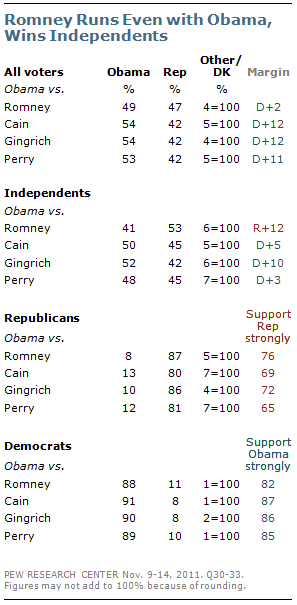
Mitt Romney continues to run even with Barack Obama in a hypothetical matchup for the 2012 presidential election. Among all registered voters, 49% say they would back Obama, 47% Romney, virtually unchanged from a month ago when 48% supported each candidate. By contrast, Obama holds double-digit leads over Herman Cain, Newt Gingrich and Rick Perry.
This difference reflects Romney’s substantially stronger support among independents. Independents favor Romney by a 12-point margin over Obama – 53% to 41%. This, too, is unchanged from a 13-point margin last month (54% to 41%). By contrast, each of the other leading GOP contenders trails Obama among independents by at least narrow margins.
Regardless of which GOP candidate wins the nomination, at least 80% of Republican voters intend to back their party’s nominee. And while enthusiasm for Romney in the primaries may be lagging, there are no signs that Republicans would not back him if he wins the nomination. Fully 87% of Republicans say they would support him over Obama, and 76% say they would support him strongly. This is as high as the level of intense support Cain, Gingrich or Perry would receive from Republican voters.
Similarly, there is little to suggest that the outcome of the GOP primaries would affect Democratic voters, roughly 90% of whom intend to back Obama, regardless of his opponent. At least eight-in-ten Democrats say they would support Obama strongly, with no significant difference in intensity depending on the GOP nominee. (For details on the 2012 matchups, see detailed tables at the end of this report).
GOP Race Still Muddled
There is no clear frontrunner nationwide for the GOP primary – 23% of Republican and Republican leaning registered voters favor Romney for the party nomination, while 22% support Cain, and 16% back Gingrich. No other candidate breaks double-digits.
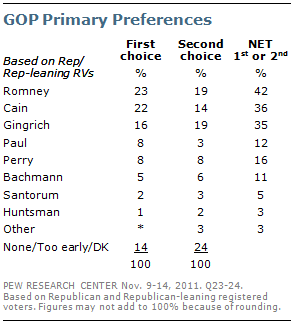
A look at Republican voters’ second-choice candidates reinforces the separation between the top three candidates and the rest of the field. In addition to the 23% who favor Romney for the nomination, another 19% say he would be their second choice; thus, 42% pick Romney as one of their preferred options. More than a third (36%) pick Cain as either their favorite (22%) or second-choice (14%) candidate and about the same number (35%) names Gingrich as either their first (16%) or second (18%) choice. The next closest candidate – Perry – receives less than half as much support as any of these three.
The overlap in support for these candidates also is noteworthy. A majority of Gingrich supporters name either Romney (38%) or Cain (30%) as their second choice candidate. Most Cain supporters name either Romney (31%) or Gingrich (31%) as their second choice. And most Romney supporters would turn to either Gingrich (35%) or Cain (18%) as their second choice.
Views among Tea Party Republicans
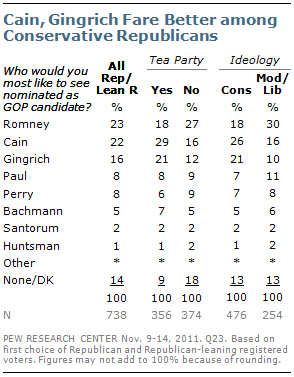
Cain holds a modest edge among Republican and Republican-leaning voters who agree with the Tea Party Republicans: 29% favor Cain, while 21% back Gingrich and 18% favor Romney. Romney holds a sizeable lead among non-Tea Party Republican voters, with 27% backing him compared with 16% for Cain and 12% for Gingrich.
Roughly six-in-ten Republican voters describe themselves as conservative, and their support is divided between Cain (26%), Gingrich (21%), and Romney (18%). Among the smaller share who say they are moderate or liberal, Romney holds a commanding lead, with 30% backing him compared with 16% for Cain and 10% for Gingrich.
Cain receives less support from Republican women (17%) than from Republican men (27%). He also gets less backing from Republicans 65 and older (13%) than those younger than 65 (25%). By contrast, Gingrich is favored by 22% of GOP voters 65 and older, and 18% of those 40-to-64, but just 6% Republican voters younger than 40.
Cain also gets significantly more support from higher-income Republicans than those with lower incomes. Republican voters with family incomes of $75,000 or more back Cain at nearly twice the rate of those with incomes of less than $30,000 (28% vs. 15%).
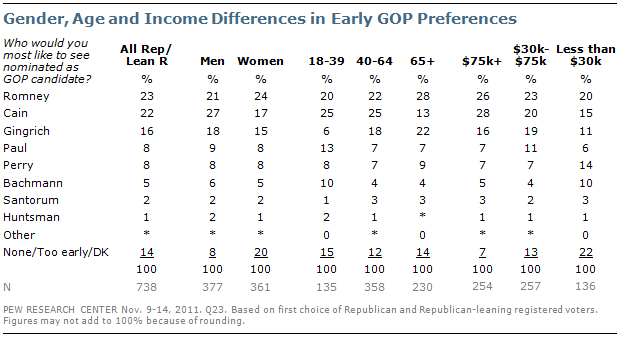
Views of Cain Allegations
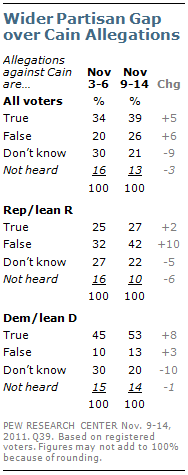
As more information about the sexual harassment allegations against Cain has surfaced, a growing proportion of voters feel able to assess the veracity of the claims. While the balance of opinion has not shifted overall, Republican and Democratic assessments of the situation are growing further apart.
The survey began a few days after one of Cain’s accusers held a press conference (on Nov. 7) and Cain held his own press conference the next day to deny the allegations. Nearly four-in-ten voters (39%) say the allegations are true, up from 34% in a Pew Research Center survey conducted the previous week (Nov. 3-6). At the same time, a growing number also say the allegations are false (26% up from 20%). The share with no opinion fell from 46% to 34%.
An already wide partisan gap in evaluations has grown larger. The share of Republicans and Republican leaners who say the claims are false has risen from 32% to 42%, while the share of Democrats and Democratic leaners who say they are true rose from 45% to 53%.
Among Republicans and Republican leaners, most who agree with the Tea Party reject the accusations; 56% say they are false and just 20% true. Among
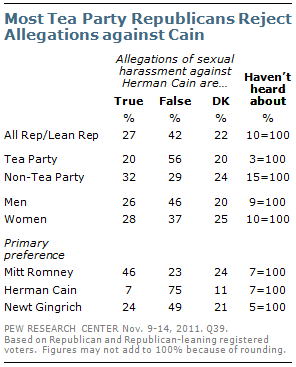
Republicans who disagree or offer no opinion of the Tea Party, views are more divided; 32% say the allegations are true, 29% false. Nearly half (46%) of Republican men say the allegations are false, compared with 37% of Republican women.
Three-quarters (75%) of Republican and GOP-leaning voters who favor Cain for the party’s presidential nomination say the claims are false; just 7% think they are true. By a two-to-one margin (49% false, 24% true), Gingrich supporters also reject the claims. Romney supporters differ substantially; nearly half (46%) of Romney’s supporters say the allegations are true, while just 23% believe they are false.
Comparing Romney and Cain
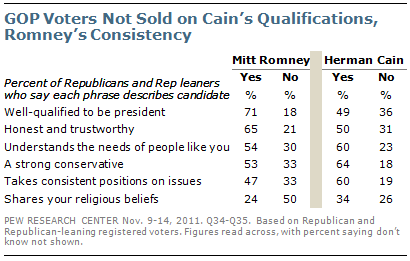
Fully 71% of Republican and Republican-leaning voters say that Mitt Romney is well- qualified to be president, and 65% describe him as honest and trustworthy. Republicans’ assessments of Herman Cain are more divided on these traits. Only about half (49%) of Republican-oriented voters say that Cain is well- qualified to be president, while 36% say he is not. And half (50%) say Cain is honest and trustworthy, while 31% do not think this describes Cain.
But Cain has the advantage over Romney when it comes to consistency and conservatism. Where 64% of Republicans and Republican leaners see Cain as a strong conservative, barely half (53%) say the same about Romney. Among conservatives, 73% say Cain is a strong conservative, while just 53% say the same about Romney.
And the criticism that Romney has been inconsistent also resonates with Republicans: 47% of Republican and Republican-leaning voters say Romney takes consistent positions on issues while 33% say he does not. In assessing Cain, 60% say he holds consistent positions, while 19% say he does not.
Romney and Health Care
One particular issue for Romney is his support of a major healthcare overhaul when he was governor of Massachusetts. By more than two-to-one, more Republicans and Republican
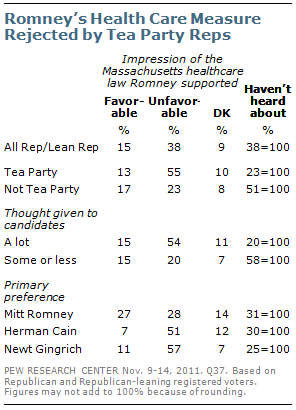
leaners have an unfavorable (38%) than favorable (15%) opinion of this law, though nearly half offer either no opinion (9%) or have heard nothing about it (38%).
Disapproval of Romney’s Massachusetts health care record is particularly high among engaged Republican voters: 54% of those who have given a lot of thought to the campaign and candidates say they have an unfavorable opinion of the Massachusetts law, while just 15% view it favorably. A comparable majority (55%) of Republicans and GOP leaners who agree with the Tea Party view the law unfavorably, while just 13% view it favorably.
Most Cain and Gingrich supporters are aware of the Massachusetts health care law and disapprove of it. Romney supporters are more divided: 27% view the law favorably while 28% view it unfavorably; the rest either offer no opinion (14%) or say they have not heard about it (31%).
Moderate Republicans Less Satisfied with GOP Field
Republicans continue to show little enthusiasm for the field of candidate running for the party’s presidential nomination. Among all Republican and Republican-leaning voters, 48% say that as a group the GOP candidates are excellent or good, while 46% rate them as only fair or poor.
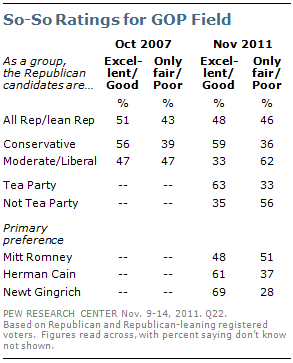
The balance of opinion was somewhat more positive four years ago. As Republicans evaluated a field then headed by Rudy Giuliani, John McCain, Fred Thompson, Mitt Romney and Mike Huckabee, more rated the candidates as excellent or good (51%) than fair or poor (43%).
Moderate and liberal Republican and Republican-leaning voters are particularly unenthusiastic about the field this year. Just 33% rate the current crop of candidates favorably, while 62% say they are only fair or poor. In October 2007, nearly half (47%) offered favorable assessments of the GOP candidates.
There are also differences in how supporters of different candidates rate the field as a whole. Large majorities of Gingrich supporters and Cain supporters say that the field, as a group, is excellent or good (69% and 61%, respectively). Romney supporters are less positive – just 48% say the group of GOP candidates is excellent or good, while 51% say they are only fair or poor.
GOP Engagement Spikes
The share of Republican and Republican leaning voters who say they have given a lot of thought to the 2012 candidates has spiked from 39% to 52% over the last month.
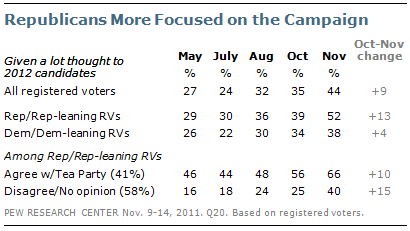
Democrats and Democratic leaners, by comparison, are far less engaged in a campaign focused on the looming Republican primaries and caucuses.
At 52%, the share of Republicans closely tracking the campaign is higher than four years ago. Just 42% of Republicans and Republican leaners had given a lot of thought to the 2008 candidates in November of 2007.
There continues to be a sizeable engagement gap between Tea Party and non-Tea Party Republicans – 66% of the former have given a lot of thought to the candidates compared with 40% of the latter. But the recent jump in engagement crosses both segments of the party. In particular, 40% of Republicans and Republican leaners who say they either disagree or have no opinion about the Tea Party movement have now given a lot of thought to the candidates, up from 25% a month ago, and just 18% as recently as July.
Romney Viewed as Most Electable
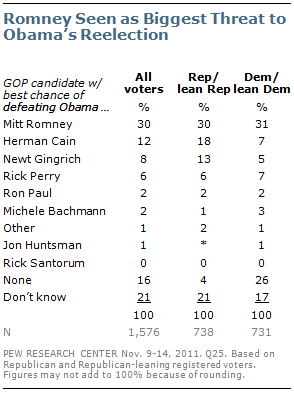
When voters are asked which Republican has the best chance of defeating Obama next November, Mitt Romney is seen as the strongest candidate by a wide margin. Among all registered voters, 30% say Romney has the best chance to unseat the incumbent Democrat. Just 12% say Herman Cain has the best chance. No other candidate reaches double-digits.
Among Republican and Republican-leaning voters, 30% say Romney has the best chance of beating Obama, 18% say Cain, and 13% Gingrich. (This compares to 23% who support Romney as their first choice for the nomination, 22% who support Cain, and 16% Gingrich).
And as Democrats and Democratic leaners look at the Republican field, only Romney stands out as a significant threat, with 31% saying he has the best chance of defeating Obama. The next closest candidates are at 7% (both Cain and Perry). Fully 26% of Democrats say that none of the GOP candidates has a chance of beating Obama this fall – just 4% of Republicans offer this opinion.




